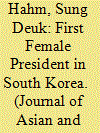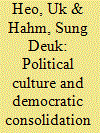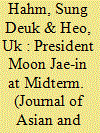| Srl | Item |
| 1 |
ID:
160814


|
|
|
|
|
| Summary/Abstract |
When Park Geun-hye was elected South Korea’s first female president in 2012, many expected that South Korea’s democracy would deepen. Contrary to the expectation, however, from the beginning of her administration, there were concerns about democracy retreating due to her leadership style/qualities. Despite her rather “undemocratic” leadership qualities, Park Geun-hye has consistently received 30% or higher job approval ratings until “Choi Soon-sil gate” broke out in October 2016. Thus, in this study, we analyzed what led to her leadership qualities and makes it possible for her to maintain a relatively high level of job approval ratings. We argue that her leadership qualities are the product of her unique personal background and South Korea’s immature democratic institutions. She receives relatively strong support thanks to her father, President Park Chung-hee’s (1961–1979) legacy.
|
|
|
|
|
|
|
|
|
|
|
|
|
|
|
|
| 2 |
ID:
179264


|
|
|
|
|
| Summary/Abstract |
Ever since the concept of soft power was introduced, there has been debate about what it is and how it works. We join the debate by studying how the success of Korean cultural products in Taiwan has improved the relationship between South Korea and Taiwan. The two countries normalized their relationship in 1948 and maintained cooperation until the severance of formal ties in 1992 because of South Korea’s rapprochement with China. Beginning in early 2000, however, South Korea’s cultural products have enjoyed great success in Taiwan. Since that time, the relationship between the two countries has significantly improved, including trade and tourism expansion, increased Taiwanese direct investment in South Korea, and policy changes by Taiwan’s government. These changes provide empirical evidence of soft power.
|
|
|
|
|
|
|
|
|
|
|
|
|
|
|
|
| 3 |
ID:
134701


|
|
|
|
|
| Summary/Abstract |
South Korea experienced democratization in 1987, yet violations of the democratic rule of law are rather common; such actions are far from routine practices of democratic institutions. We argue that South Korea’s political culture is the reason for the tardy maturing of democratic institutions.
|
|
|
|
|
|
|
|
|
|
|
|
|
|
|
|
| 4 |
ID:
175112


|
|
|
|
|
| Summary/Abstract |
Despite the unsuccessful outcomes of his policies on economic growth and North Korea, Moon Jae-in at midterm has received relatively high levels of job approval ratings compared to his immediate predecessors. What made it possible for him to maintain these ratings? To analyze this puzzle, we employed the three commonly noted leadership qualities—effective communication, political skill, and organizational capacity—suggested by presidential study scholars. We found that Moon Jae-in’s leadership qualities are not the compelling reason for his relatively high approval ratings. Instead, there are three alternative reasons for Moon Jae-in’s relatively high approval ratings: (a) better handling of the media; (b) collapse of the conservatives; and (c) multiple summit meetings with Donald Trump and Kim Jong-un. The latter two reasons are contextual factors, which are our theoretical contribution to the literature.
|
|
|
|
|
|
|
|
|
|
|
|
|
|
|
|
| 5 |
ID:
172461


|
|
|
|
|
| Summary/Abstract |
The two biggest stories of 2019 in South Korea were a series of meetings between US President Donald Trump and North Korean leader Kim Jong-un to discuss the denuclearization of North Korea in the first half of the year, and the trade war with Japan in the second half. President Moon Jae-in’s income-led growth policies still have not stimulated the economy. In fact, South Korea’s macroeconomic performance was virtually at a standstill; the economic growth rate in 2019 has stayed below 2.0%, showing no sign of turnaround.
|
|
|
|
|
|
|
|
|
|
|
|
|
|
|
|